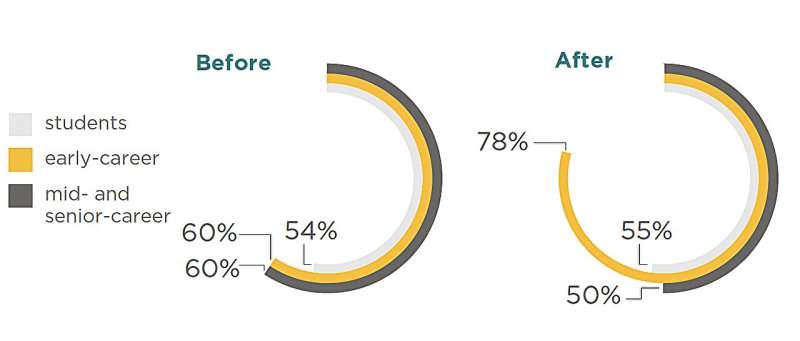This article has been reviewed according to Science X's editorial process and policies. Editors have highlighted the following attributes while ensuring the content's credibility:
fact-checked
proofread
Anonymization for equity and diversity in Australian research

A multi-year study, published as a preprint article led by the office of Australia's Women in STEM Ambassador investigated the impact of anonymization (removing identifying names and other information) on applications for access to research facilities in Australia. The results provide crucial insights that have the potential to reshape the landscape of equity and diversity in the research sector.
The study revealed a substantial discovery: Anonymizing applications for scientific equipment significantly benefitted early career researchers, offering them an increased chance of success, irrespective of gender.
Australia's Women in STEM Ambassador, Professor Lisa Harvey-Smith, says, "This study goes beyond the usual assumptions about anonymization in competitive grants and highlights the real struggles of early-career researchers in academia."
Key findings:
- Before anonymization, no gender gaps in application outcomes were observed.
- The introduction of anonymization maintained the existing gender equity landscape.
- Anonymization enhanced success rates for early career researchers, fostering diversity in the research pool.
- The study suggests a positive impact of anonymization on the broader retention and advancement of researchers facing barriers in STEM research.
Dr. Isabelle Kingsley, lead researcher on the study, says, "Our focus was on finding out how organizations could create an equitable research environment. Anonymization proved to be a powerful tool."
Associate Professor Lisa Williams, Chief Investigator on the grants that funded this work, remarks, "Anonymizing applications removes access to information that can lead to psychological biases, offering a fairer assessment for all applicants."
Dr. Isabelle Kingsley emphasizes, "Securing access to research facilities is as pivotal as winning grants. Anonymization levels the playing field, making it less about prestige and more about merit."
Driving positive change in STEM
The study's impact extends beyond application outcomes, potentially creating a positive ripple effect in the STEM career pipeline. Removing personal information from applications can be a catalyst for removing systemic barriers to career advancement.
In conclusion, Professor Harvey-Smith states, "Access to research facilities is just one piece of the puzzle in STEM inequity. Anonymization addresses a crucial aspect, fostering a more inclusive and diverse research landscape."
The research was conducted by the office of the Australian Government's Women in STEM Ambassador at UNSW Sydney, focusing on four key research infrastructure collections in Australia. The research brief and preprint can be accessed here.
More information: Isabelle Kingsley et al, Evaluating the cross-disciplinary utility of anonymizing applications for scientific equipment in the Australian research sector (2023). DOI: 10.31219/osf.io/jyq2f
Provided by The Australian Government's Women in STEM Ambassador




















